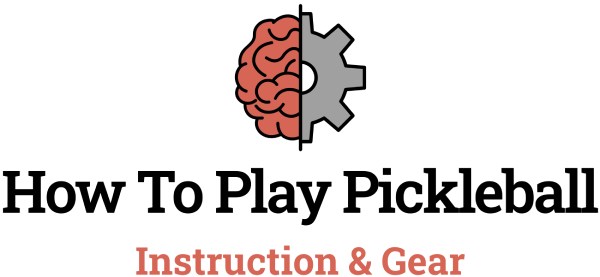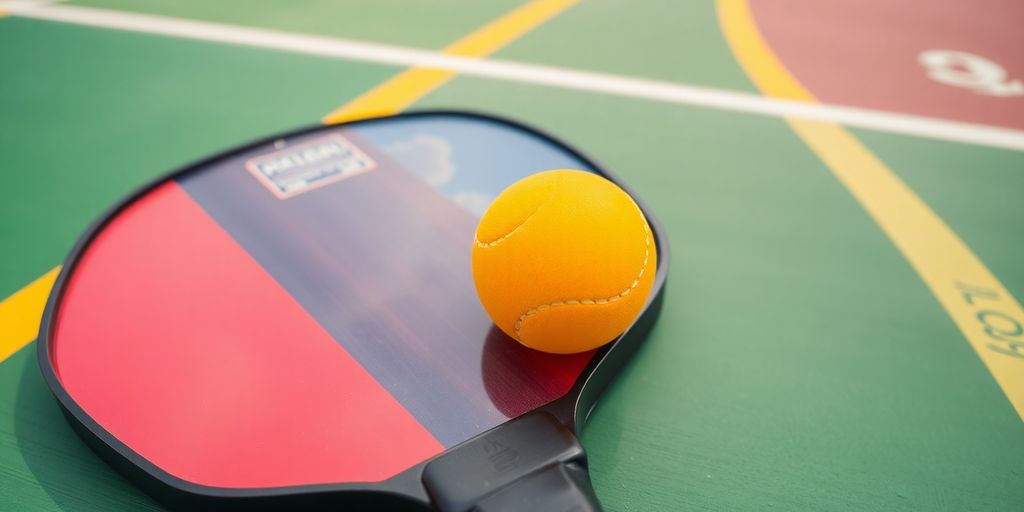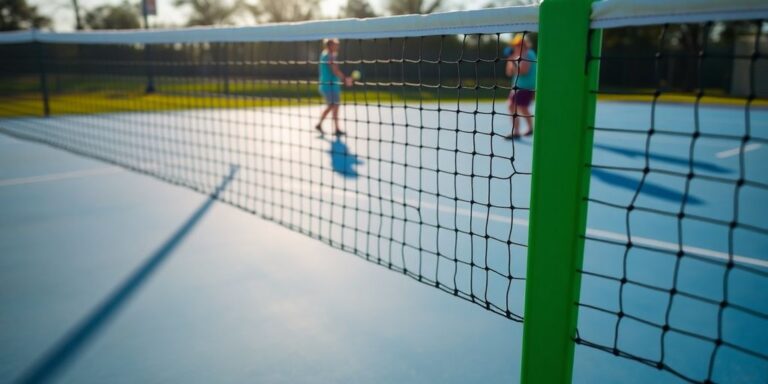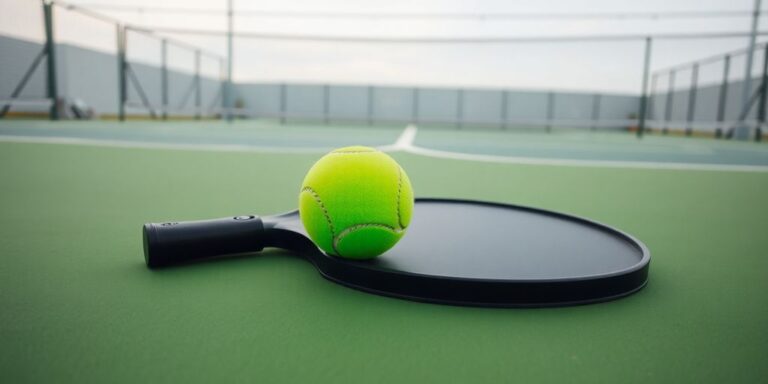Pickleball is a sport that’s caught the attention of many, but the story behind its quirky name is still a bit of a puzzle. Created back in 1965 on Bainbridge Island by Joel Pritchard and his pals, this game mixed elements from badminton, table tennis, and tennis. But why “pickleball”? Some say it’s named after a dog, others claim it’s from a rowing term. Let’s explore these stories and see why the name matters.
Key Takeaways
- Pickleball’s name has two main origin stories: one involving a dog named Pickles and the other a rowing term called ‘pickle boat.’
- The dog story is charming but doesn’t line up with the timeline since Pickles the dog wasn’t around when the game was first created.
- The ‘pickle boat’ theory suggests the game was named because it combined elements from different sports, much like how a pickle boat is made up of leftover rowers.
- Despite the debate, pickleball has grown massively in popularity, becoming a beloved sport in the U.S. and beyond.
- The name, whether from a dog or a boat, adds a layer of charm and intrigue that keeps the community engaged.
The Origins of Pickleball: A Historical Perspective

The Birth of a New Sport
Back in the summer of 1965, on Bainbridge Island, Washington, three dads—Joel Pritchard, Bill Bell, and Barney McCallum—were trying to entertain their kids. They came up with a new game that mixed elements from tennis, badminton, and ping-pong. This spontaneous invention marked the birth of pickleball, a sport that would later captivate people of all ages. Using whatever they had on hand, they improvised with ping-pong paddles and a perforated plastic ball, often referred to as a wiffle ball. It was a simple setup, but it worked.
The Role of Bainbridge Island
Bainbridge Island wasn’t just a random location; it was the perfect backdrop for the birth of this sport. The island’s close-knit community and the summer vibe made it an ideal place for families to gather and play. The sport started as a backyard game but quickly spread through word of mouth, with neighbors and friends joining in the fun.
Key Figures in Pickleball’s Creation
Joel Pritchard, Bill Bell, and Barney McCallum were the masterminds behind pickleball. Pritchard, a U.S. Congressman, and his friends were known for their creativity and love for sports. They didn’t just stop at inventing the game; they were also instrumental in refining the rules and equipment. Their vision and collaboration laid the foundation for pickleball’s journey from a casual backyard game to a recognized sport across the nation. By 2022, pickleball had gained official status, reflecting its widespread appeal and growing popularity.
The Pickles the Dog Theory: Fact or Fiction?
The Story of Pickles the Dog
So, there’s this charming tale about how pickleball got its name thanks to a dog named Pickles. According to the story, Pickles the Dog belonged to one of the sport’s creators and had a knack for snatching stray balls during their games. The dog would gleefully dash across the court, grabbing the ball and bringing it back, much to everyone’s amusement. This playful behavior supposedly inspired the name "pickleball," making it a sweet nod to their furry friend.
Debunking the Dog Theory
But hold on, here’s where things get a bit fuzzy. The timelines don’t quite add up. Historical records show that Pickles the dog wasn’t even around when the game was invented. Pickleball came to life in 1965, yet Pickles didn’t join the family until 1968. This little hiccup throws a wrench in the dog theory. Despite the story’s charm, evidence points to a different origin. Some of the game’s founders have mentioned that the name actually came from the term "pickle boat," a rowing term for a crew made up of leftover oarsmen.
The Impact of the Dog Story on Pickleball Culture
Even though the dog theory might not hold water, it’s still managed to capture the hearts of many. The story of Pickles the dog adds a layer of whimsy to the sport’s history. It’s a tale that’s been told and retold, becoming a part of pickleball’s cultural fabric. It’s like the sport’s little inside joke, a quirky anecdote that makes it even more endearing. Whether or not Pickles really inspired the name, the legend lives on, adding to the fun and friendly vibe that pickleball is known for.
The Pickle Boat Theory: A Nautical Inspiration
Understanding the Pickle Boat Term
The term "pickle boat" comes from the world of rowing. It’s used to describe a boat crewed by leftover oarsmen from other boats, essentially a mismatched crew. Joan Pritchard, who coined the name "pickleball," drew inspiration from this term. She felt it was fitting because, just like a pickle boat, the game of pickleball was an amalgamation of elements from different sports.
How Rowing Influenced Pickleball’s Name
Joan Pritchard’s background in rowing played a significant role in naming pickleball. During her rowing days, she often encountered pickle boats, and the concept stuck with her. When it came time to name the new sport she helped create, she saw parallels between the mix-and-match nature of pickle boats and the way pickleball combined badminton, tennis, and table tennis elements. This connection between rowing and pickleball’s inception highlights the sport’s eclectic roots.
Comparing the Boat and Dog Theories
There are two main stories about how pickleball got its name: the pickle boat theory and the dog theory. While the pickle boat story is rooted in Joan Pritchard’s rowing experiences, the dog theory suggests the game was named after the Pritchard family’s dog, Pickles. However, records show that Pickles the dog wasn’t even around until three years after the game was created. This timeline discrepancy gives more weight to the pickle boat theory as the true origin of the name.
The ongoing debate about pickleball’s name adds an intriguing layer to its history. Whether it was inspired by a dog or a boat, the name has stuck, and the sport has grown beyond anyone’s expectations. The quirky name, much like the sport itself, has become a conversation starter and a unique part of its charm.
The Evolution of Pickleball Equipment and Rules
From Backyard to Official Courts
Back in 1965, pickleball was just a fun, makeshift game invented by three friends on Bainbridge Island. They used table tennis paddles and a perforated plastic ball, often a whiffle ball, on a badminton court. As the sport gained popularity, it quickly outgrew its backyard roots. Just two years later, the first permanent pickleball court was built, paving the way for the sport’s transition to a more official status. This marked a significant shift in how the game was played and perceived.
Development of Pickleball Paddles
The journey of the pickleball paddle is a story of innovation. Initially, players made do with ping-pong paddles, but these were far from ideal. As the game evolved, so did the equipment. Specialized paddles were developed to offer better grip and control, significantly enhancing player performance. Today, composite paddles are the norm, offering players increased precision and power.
The Introduction of Specialized Pickleballs
In the early days, any softball-sized whiffle ball would suffice for gameplay. However, these balls were prone to wind interference, affecting accuracy and consistency. This led to the development of specially manufactured pickleballs designed to minimize wind issues and provide a reliable bounce. These innovations have made the game more enjoyable and accessible to players of all skill levels.
Pickleball’s transformation from a casual backyard game to a structured sport with specialized equipment highlights the ingenuity and passion of its community. As technology continues to advance, who knows what the future holds for this beloved sport?
Pickleball’s Rise to Popularity
The Growth of Pickleball in the USA
Pickleball has exploded in the United States, capturing the hearts of millions. As of 2023, around 36.5 million people were playing pickleball across the country. This surge is largely due to its accessibility and simplicity, making it a favorite pastime for families and communities. The sport’s rules are straightforward, which means anyone can pick up a paddle and join in the fun. During the COVID-19 pandemic, people turned to outdoor activities, and pickleball stood out as a safe option. This period saw a notable increase in new players, eager to enjoy some fresh air while staying active.
International Expansion and Recognition
Beyond the U.S., pickleball is making waves globally. Countries around the world are embracing this exciting sport, with new courts popping up in unexpected places. The international tournaments are drawing athletes from various backgrounds, showcasing pickleball’s universal appeal. As more nations recognize the sport, it’s gaining a foothold on the international stage, with hopes of one day being included in the Olympics. This global expansion highlights the sport’s potential to unite people through friendly competition.
The Role of Community and Inclusivity
Pickleball isn’t just a sport; it’s a community builder. Its inclusive nature allows people of all ages and skill levels to play together, fostering friendships and connections. The community spirit is a big part of why pickleball is so beloved. From local clubs to national leagues, the sport encourages social interaction and camaraderie. Whether you’re playing in a backyard or a professional tournament, the joy of pickleball lies in its ability to bring people together, creating lasting bonds and memories.
The Cultural Significance of Pickleball’s Name

Why the Name Matters
The name "pickleball" is more than just a quirky moniker; it’s a testament to the sport’s unique origins and its evolving identity. The name itself has sparked countless discussions and debates, making it an integral part of the sport’s culture. While some argue that the name might not capture the sport’s competitive nature, its playful and approachable sound has undeniably contributed to its broad appeal. The term "pickleball" evokes curiosity, drawing people in and encouraging them to learn more about this fascinating game.
Pickleball in Popular Culture
Pickleball has made its way into popular culture, becoming a favorite pastime for celebrities and everyday folks alike. It’s not uncommon to hear about pickleball matches in TV shows or see references in movies. This cultural penetration highlights the sport’s growing influence and how its name has become synonymous with fun and community. The quirky name adds an element of intrigue, making it memorable and easily recognizable.
The Future of Pickleball’s Identity
As pickleball continues to grow, its name will likely remain a topic of conversation. The sport’s rapid expansion suggests that its identity will keep evolving, but the name "pickleball" is likely to stay. It’s a name that has come to represent more than just a sport—it’s a symbol of inclusivity, community, and joy. As the sport gains international recognition, the name will continue to carry with it a sense of nostalgia and innovation, bridging generations and cultures.
Exploring Other Theories Behind the Name
The Paddle Shape Theory
There’s an interesting theory out there that suggests the name "pickleball" might have come from the shape of the paddles used in the game. Back in the day, when the game was just getting started, players used wooden paddles. Some folks say these paddles reminded them of a "pickle boat" because of their unique shape. This theory is less talked about but adds another layer to the mystery.
Folklore and Anecdotes
Over the years, various stories have popped up, each trying to explain the quirky name. Some people even think it was just a random choice, a playful nod to the sport’s fun and casual nature. It’s like how some bands pick names that just sound cool, without any deep meaning behind them.
The Ongoing Debate Among Enthusiasts
The debate over the name’s origin is still alive and well among pickleball fans. Here are a few key points that keep the conversation going:
- Some insist the dog story is true, despite the timeline not matching up.
- Others are firm believers in the "pickle boat" theory, given its logical connection to the sport’s mix-and-match nature.
- A few enjoy entertaining the less-known paddle shape theory, just for the fun of it.
Whether it’s the dog, the boat, or the paddle, the name "pickleball" adds a bit of charm and mystery to the game. It’s one of those things that keeps people talking and adds to the sport’s unique culture.
In this section, we dive into various theories that could explain the name’s origin. Each idea offers a unique perspective, sparking curiosity and discussion. If you’re eager to learn more about pickleball and enhance your skills, visit our website for exclusive insights and resources!
Conclusion
So, there you have it. The name "pickleball" is a bit of a puzzle, isn’t it? Whether it came from a cute dog named Pickles or a rowing term about leftover crews, the mystery adds a fun twist to the game. And maybe that’s part of why people love it so much. It’s not just about hitting a ball over a net; it’s about the stories, the laughs, and the community that comes with it. As pickleball keeps growing, maybe one day we’ll see it in the Olympics. Who knows? But for now, let’s just enjoy the game and the quirky name that keeps us guessing.
Frequently Asked Questions
Why is pickleball named after a dog?
Some people believe pickleball got its name from Pickles, a dog who loved to chase the ball during games. However, this story is more of a fun legend than a fact.
What does ‘pickle boat’ mean, and how is it related to pickleball?
In rowing, a ‘pickle boat’ is a crew made up of leftover rowers from other teams. The creators of pickleball thought this was a good name since the game mixes parts of different sports.
When did pickleball start to become popular?
Pickleball started gaining popularity in the 1970s and 1980s, but it really took off in the 2000s as more people discovered how fun and easy it is to play.
Is pickleball only popular in the USA?
No, pickleball is played all over the world. It started in the USA, but now many countries have pickleball clubs and tournaments.
What makes pickleball different from other sports?
Pickleball is a mix of tennis, badminton, and ping-pong. It uses a small court and a wiffle ball, which makes it easier for people of all ages to play.
Can anyone play pickleball, or is it just for athletes?
Anyone can play pickleball! It’s designed to be easy and fun, so people of all ages and skill levels can enjoy it.




